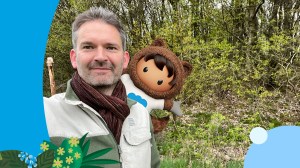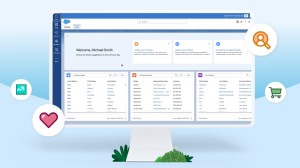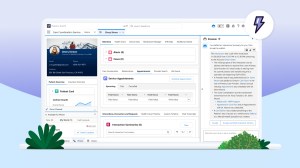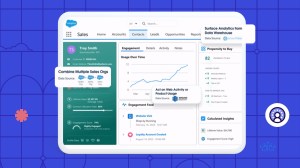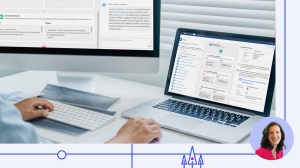Tim Christophersen wears his love of nature proudly on his sleeve. It was formed early on in life where he would spend hours in the forests of Germany with his grandfather. It continues today with his daily work on the Christophersen family farm with a focus on permaculture, self-sufficiency and local restoration about an hour outside of Copenhagen.
This personal passion also led Christophersen to an international career in sustainability. After spending more than 15 years with the United Nations Environment Programme working to reduce deforestation, ensure fresh drinking water and protect biodiversity in developing countries, Christophersen joined Salesforce in May 2022 as VP of Climate Action. His time spent at the UN was rewarding, but the ability to do more in the corporate world was intriguing to Christophersen.
“There’s a sustainability revolution that is happening right now,” he says, and Salesforce’s commitment to sustainability make it the perfect place for him to drive real impact.
Ahead of World Environment Day (June 5) and World Oceans Day (June 8), Christophersen offers a preview of what to expect from him and his team:
Q: What drew you toward a climate action role at Salesforce?
I believe climate change is the defining issue of our time, and linked to that is the risk of a collapse of nature’s ecosystems. The planetary boundaries are being breached, and we need to react to that with unprecedented scale and speed. While we may have a lot of regulatory policy signals in place, we often miss the big changes that can only come if a lot of innovation, investment, and entrepreneurship happens at the same time. The climate and nature crisis can spur this race of innovation!
That’s the role of the private sector, and within that, Salesforce has a superpower — our customers. Their success is our success, and tapping into that superpower to create change across the private sector, that was something I couldn’t resist.
Q: What are some experiences you have had that shaped your passion and bond with our planet?
My grandfather was a forester, and he took me out into the forest a lot when I was a boy. That was a big part of shaping my view of why nature is important and why it is good for both your physical and mental health.
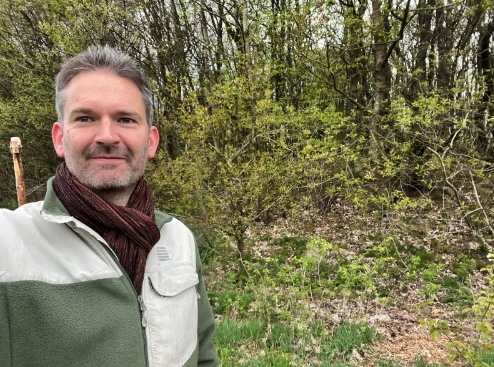
I’ve experienced those things first-hand, and then I’ve basically spent my entire career in supporting nature in support of human livelihoods, of health, of jobs, of economic development. But always with an angle of giving nature a seat at the table and a role she deserves as an ally.
For example, right now my family and I live on a farm, so we’re establishing a permaculture garden for self sufficiency but also to see how we can restore the soil. The idea of producing locally and in a way that is completely sustainable is not only a hobby, but I think gives depth to the things we talk about. The world’s agri-food systems are going to be the key to sustainability. It’s one of the single largest sources of emissions, it’s the largest user of freshwater. We have to change the way we farm and the way we eat.
Q: You have been in the role for a month now. What are some of the biggest takeaways or surprises you’ve had so far?
Surprise number one is how differently the two worlds operate. In general, the private sector and the UN are fairly disconnected, and at Davos it was very clear that the UN’s Sustainable Development Goals play a role in the decision making at many companies, but they’re not yet central to every decision, as they should be. There’s an understanding that sustainability is the most important emerging issue, but it hasn’t really translated into mainstream decision making in the private sector so far.
Another takeaway is the resources and speed in decision-making in the private sector. The resources available are orders of magnitude larger than in the UN, and that leads me to think that the most powerful example of change would be highly focused public-private partnerships. You take the legitimacy, transparency, and credibility of the UN and pair it with the power of public innovation – that partnership will be even more important in the next 10 years than it has ever been.
Q: What are you most looking forward to working on and accomplishing at Salesforce?
One is to really tap into Salesforce’s customer base to find out how we can best help customers who are on the cutting edge of making climate action and net zero commitments accelerate those efforts.
The other is nature-based solutions, which are gaining traction and that’s where I will focus a lot of my time. I want to empower our customers to make nature-positive commitments to stand alongside net zero as the next big thing in sustainability. How does a company become nature-positive in addition to being net zero, and how do we measure success? If those two things are together, they are the foundation for achieving the Sustainable Development Goals. Only with a functioning biosphere and a stable climate can we pursue goals like equality, peace and well-being for all!
Q: Can you explain nature-based solutions a bit and talk about why they’re so important to you?
I’ll give you two examples that are very relevant.
We have a surge in extreme weather events globally, and one of the most effective ways to counter this is by having intact mangrove forests. They’ve been shown to be very effective in buffering coastal areas from storm surges and flooding. And in cities, the restoration of natural spaces leads to so-called “sponge cities” where you use nature to help cities absorb flash floods, extreme rainfall, and other weather events than they could if just covered by concrete and buildings.
There are many different types of nature-based solutions. They always serve a societal need – it depends on the problem you want to solve, and usually there is a nature-based solution. It’s not a new idea or concept, but the concept has fallen into neglect and we have to rediscover and invent new nature-based solutions because they’re often the most effective and efficient investment in solving for sustainability.
Q: What’s the right mindset for companies big or small to make initial or big leaps forward with sustainability?
It’s important to get started and not see it as something you start today and finish in a year. This will stay with us for decades. Nature loss, climate change, fragility of supply chains – it’s a journey we’re all on and will stay on. But once you make the mindset shift, it becomes easier, because then it’s about gradual improvements.
Two things that are important for Salesforce in particular is how we can help customers by making the sustainable option the easy option. Right now, it’s the hard option because it’s complicated and sometimes costs more, and is difficult to monitor. With solutions like Net Zero Cloud, the sustainable option is the easier option.
The other thing Salesforce can do is to continue to be open, transparent, and vulnerable by saying we don’t have all the answers. Nobody does. We should be open about it being a learning journey and sometimes there will be mistakes, but that’s how you learn. As we establish solutions together, we have to learn as a global community from each other. It’s more about collaboration than competition of who has the best idea or moves the fastest.
Q: What are the best lessons you’ve learned from your life experiences and career in sustainability?
One of the biggest lessons from my career is you cannot scare people into action and you can’t bore them into action, both of which we’ve tried. The gloom and doom scenarios don’t work. Or at least, we can’t stop there.
The only sustained action for change comes from inspiration and collaboration. You have to inspire action through leading by example and work together to achieve those goals. It’s the only real way to change the world – to change yourself, your company, your community, your school, your country. Then you can start to talk about changing others.
More Information:
- Read Tim’s LinkedIn article about why he joined Salesforce.
- Read more information about Net Zero Cloud.
- Learn more about Salesforce’s commitment to Sustainability.
